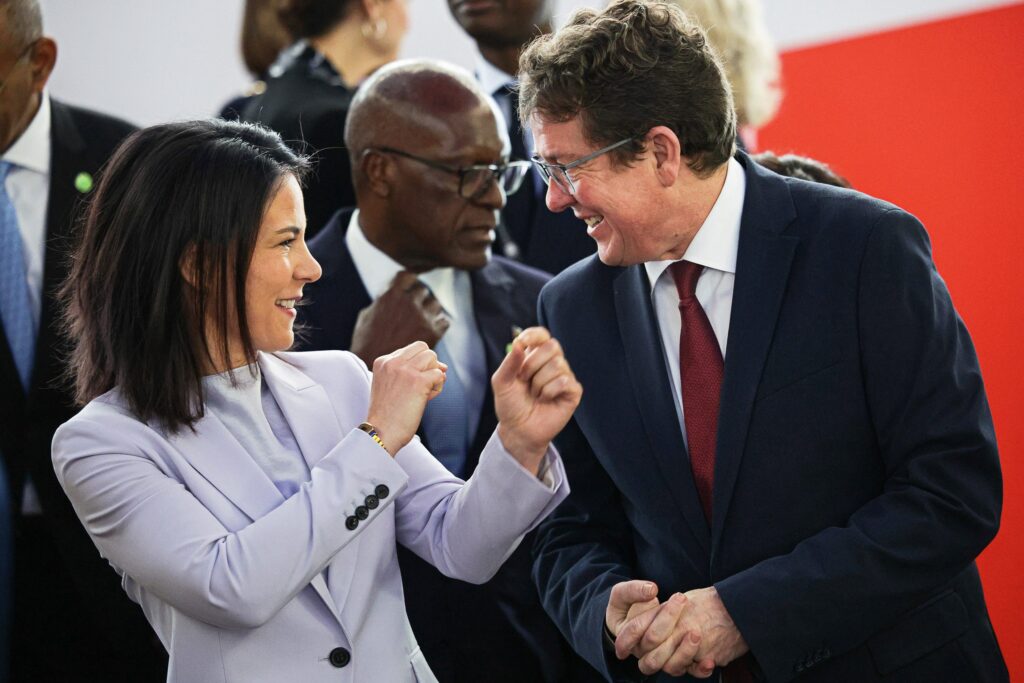The Berlin Blob

The idea of a “Blob” goes back to Ben Rhodes, President Barack Obama’s foreign-policy adviser—or “amanuensis,” as Jeffrey Goldberg of the Atlantic magazine called him. The term first comes up in a profile of Rhodes in The New York Times Magazine in May 2016, in which he was said to use the term to refer to the American foreign-policy establishment. In The World As It Is, Rhodes’s memoir of his time working for Obama, he explained that what he had in mind was the “groupthink that always seemed to lead inexorably to more military intervention in the Middle East, to ‘bomb something’.”
Although Rhodes set himself up in opposition to the Blob, he was actually more a part of it than he seemed to realize. Not only did he make the case for air strikes in Syria in 2013—which, as Rhodes himself recalls in The World As It Is, led Obama’s chief of staff Denis McDonough to refer to him and Vice-President Joe Biden’s national security advisor Jake Sullivan as “Cheney and Rumsfeld”—but he also shared the broader Washington consensus around the idea of liberal hegemony. Nevertheless, his term stuck and has now come to be used more generally to refer to a foreign-policy establishment that shares a set of assumptions and reflexes.
If we take the term “Blob” to refer to the problem of foreign-policy groupthink in this way, we can also apply it to other national capitals, where foreign policy is made inside a similarly closed world of officials, think tankers and journalists who also share a set of assumptions and reflexes—though they are often somewhat different assumptions and reflexes than the ones that define the Blob in Washington. Some Blobs are blobbier than others—and it seems to me that the Berlin Blob may be the blobbiest of them all.
In Washington, the problem of groupthink is at least limited to some extent by partisanship. As Jeremy Shapiro has pointed out, “Washington’s deeply tribal partisan political culture” means that think tankers there do argue with and challenge each other quite aggressively, even if political polarisation means it is not quite “the competitive, even adversarial, but still fact-based deliberative process for developing policy ideas” that he would ideally like. German political culture, by contrast, is more consensual, which makes the danger of groupthink even more acute than in the United States.
The problem of groupthink in Washington is also to large extent a function of the revolving door system—that is, the rotation of people from think tanks into government and back again. This actually undercuts partisan conflict—since officials require congressional approval in order to be confirmed, they cannot even afford to say or write things that will offend the other party, let alone their own. But in Germany the revolving door system does not exist and think tankers rarely go into government. On the other hand, some leading German foreign policy think tanks are government-funded (for example, the German Institute for International and Security Affairs is funded by the chancellery), which has a similar effect.
The flipside of the tendency of foreign policy elites to think alike is the way in which what they think is disconnected from what the public thinks about foreign-policy questions. Although think tankers share a set of assumptions with each other—and, to a large extent, with the Blob in other countries, at least in the West—they are often cut off from the quite different interests and preferences of ordinary people in their own countries. In the U.S., the election of Donald Trump exposed that gap and led to the idea of a “foreign policy for the middle class”—in other words, one which would deliver for ordinary people rather than just elites.
Again, however, this problem of Blob disconnect may be even more extreme in Germany than in the United States; if there is even more of a consensus among foreign-policy think tankers in Berlin than in Washington, the gap between them and the public may also be greater. German foreign policy elites, especially those who work on security policy, desperately want Germany to be more “strategic,” to “lead” on European security, to spend more on defence, to be willing to deploy military capabilities, and so on. The German public, on the other hand, is rather skeptical of all this.
German foreign policy elites mostly reject the idea that they are cut off from the public in this way; they want to believe that the German public is more hawkish than it really is. But they also think it is malleable. It is striking that, when challenged about the gap between themselves and the public, German foreign policy think tankers tend to respond by saying that they see the role of experts like them as being to educate the public. They often criticize politicians like German Chancellor Olaf Scholz, who are inevitably more in touch with the public than think tankers, for following public opinion rather than “leading.”
A good example of both the Berlin Blob’s groupthink and the way it is disconnected from the public is its response to Russia’s all-out invasion of Ukraine in February 2022. Before the war in Ukraine began, many German foreign-policy think tankers were quite defensive of Angela Merkel’s foreign policy—that is, they shared the conventional wisdom of the time while it was the conventional wisdom. But after the Russian invasion of Ukraine in February 2022, they all suddenly became hawks—and now seem to see it as their job to attack people, especially Social Democrat politicians, who are not hawkish enough.
Perhaps the most striking illustration of this was around the question of whether to send Leopard 2 main battle tanks to Ukraine, which the Berlin Blob became obsessed with for the best part of a year between 2022 and 2023. Scholz was hesitant—not least because he recognized that the public was understandably anxious about the idea of German tanks being used in a war against Russia. He therefore needed to be seen to go slow and even to be dragged by Germany’s allies into sending Leopard 2 tanks—which is what ultimately happened. But the Berlin Blob relentlessly attacked him for failing to “lead” Germany—which obviously meant following what the Blob told him to do.
What was absurd about the Berlin Blob’s campaign to “free the Leopards” was not just the facile way that it focused on the narrow question of the deployment of one weapons system as if the entire outcome of the war depended on it—which in turn contributed to the sense of disillusionment when the tanks were finally deployed and turned out not to be the game-changer many had hoped they would be—but also that it became cheerleading rather than analysis. One leading German foreign policy think tanker even suggested that she and her colleagues all wear leopard print to the Munich Security Conference.
Even as German foreign policy think tankers continue to express outrage about Russia’s occupation of Ukraine almost every day, however, they have had almost nothing to say about Israel’s expulsion and extermination of the population of Gaza since 7 October last year. It is hard to tell whether what is behind this deafening silence about Israel’s actions is conviction (i.e., that they agree with Germany’s unconditional support for Israel) or cowardice (i.e., that they are too scared to speak out about it). But the result is that there is almost no public debate among German foreign policy think tankers about one of the most important issues in international politics—and on which, again, the public is in a quite different place than elites.
Whatever the reasons for it, German foreign policy think tankers apparently do not see it as their role to openly debate anything, let alone to challenge each other, contradict each other, and push each other. Rather, they seem to see it as their role to collectively defend the conventional wisdom of the moment, to criticise or even simply ridicule others who do not share it, and to reassure and support each other. This would make more sense if foreign-policy experts had a strong track record of success in the last few decades. But in Germany as much as the United States, they have made terrible errors of judgement that have had disastrous consequences.
Realist international relations theorists like Stephen Walt have pointed out that foreign policy elites are rarely held accountable for their mistakes. It is particularly striking that neoconservatives—that is, those against whom Rhodes was reacting when he first spoke of a Blob—have been rehabilitated as anti-Trumpers. Yet the shock of 2016 also brought restrainers—that is, opponents of the consensus around liberal hegemony—into the policy debate, especially through the Quincy Institute, which was set up in 2019. Germany never had a 2016 moment. As a result, the Berlin Blob may also be even less accountable than its equivalent in Washington.


